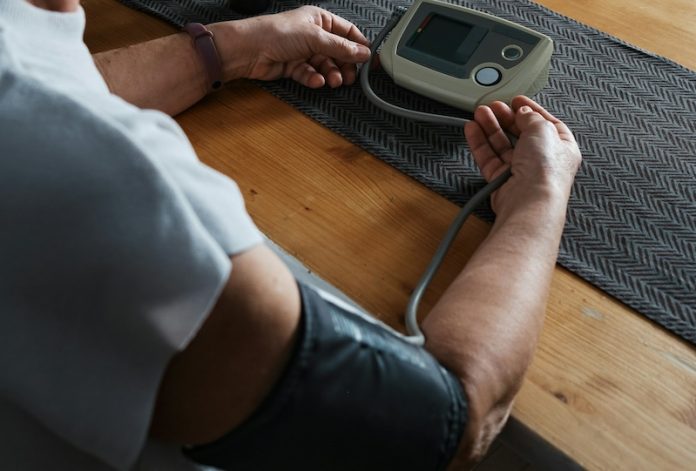
High blood pressure, also called hypertension, happens when the force of blood against the walls of your arteries is consistently too strong.
When doctors measure blood pressure, they do it in millimeters of mercury (mmHg) and record it as two numbers: the systolic pressure (the higher number) and the diastolic pressure (the lower number).
A normal reading is below 120/80 mmHg, but when the numbers regularly stay above 130/80 mmHg, it’s considered high blood pressure. The exact level of what’s considered “high” can vary depending on a person’s age, overall health, and other conditions.
Several factors can lead to high blood pressure. It might run in your family, or it could be linked to certain lifestyle habits, like eating too much salt and not enough potassium, not getting enough exercise, or dealing with stress.
It can also be related to other health issues. High blood pressure is often called the “silent killer” because most people don’t have any symptoms, even when their blood pressure is dangerously high. That’s why it’s crucial to get it checked regularly and make lifestyle changes or get treatment if needed.
The reason high blood pressure is so serious is that it increases the risk of major health problems like heart disease, stroke, and kidney disease. But there’s some hopeful news, especially for older adults who deal with this condition.
A recent study published in the journal Cardiovascular Innovations and Applications took a closer look at what the ideal systolic blood pressure (the top number) should be for people over 60 who have hypertension.
The researchers used a special analysis method that combines data from different studies to make the results more reliable. They looked at outcomes like heart attacks, heart failure, strokes, deaths from heart disease, and overall deaths.
The study included data from six different trials. The researchers grouped the treatments into three categories based on what the systolic blood pressure was after the treatment: less than 130 mmHg, between 130 and 139 mmHg, and 140 mmHg or higher.
The study found that aiming for a systolic blood pressure of less than 130 mmHg significantly reduced the risk of serious heart-related events compared to aiming for 140 mmHg or higher.
Although there were signs that more aggressive treatment might also reduce deaths from heart disease, heart attacks, heart failure, strokes, and overall deaths, the differences weren’t huge between the groups.
So, for people 60 and older, keeping systolic blood pressure below 130 mmHg might be the best target. However, the researchers emphasized that more studies are needed to confirm these findings.
If you have high blood pressure, managing it is a key part of staying healthy and preventing problems like heart disease and stroke. Here are some tips to help you keep your blood pressure in check:
Monitor Your Blood Pressure: Regularly check your blood pressure, especially if you know it’s high. You can do this at home with a monitor or at a doctor’s office.
Maintain a Healthy Weight: Being overweight increases the risk of high blood pressure. Losing weight through a balanced diet and regular exercise can help lower your blood pressure.
Eat a Healthy Diet: Focus on eating plenty of fruits, vegetables, whole grains, lean proteins, and low-fat dairy. Cut back on saturated fats, trans fats, sugar, and especially salt.
Exercise Regularly: Physical activity, like walking, biking, swimming, or jogging, can lower your blood pressure. Aim for at least 150 minutes of moderate exercise each week.
Quit Smoking: Smoking raises blood pressure and damages blood vessels. Quitting can improve your overall heart health.
Limit Alcohol: Drinking too much alcohol can raise your blood pressure. Women should limit themselves to one drink per day, and men should stick to two.
Manage Stress: Stress can cause temporary spikes in blood pressure. Try techniques like deep breathing, meditation, or yoga to keep stress levels down.
Take Medications as Prescribed: If lifestyle changes aren’t enough, your doctor might prescribe medication to help manage your blood pressure. It’s important to take these as directed and follow up with your doctor regularly.
By following these tips, you can better manage your blood pressure and reduce your risk of serious health issues.
For those interested in heart health, there’s research suggesting that apple juice may benefit your heart, and eating yogurt could lower the risk of death from heart disease.
However, if you’re concerned about blood pressure, be aware that black licorice can cause dangerously high blood pressure, and some common plant nutrients might help reduce it.
This study was led by Yuling Yan and a team of researchers who are continuing to explore the best ways to manage blood pressure, especially in older adults.
If you care about high blood pressure, please read studies about vitamins impacts on high blood pressure people need to know, and how to manage high blood pressure and diabetes with healthy foods.
For more health information, please see recent studies about the best and worst foods for high blood pressure, and modified traditional Chinese cuisine can lower blood pressure.
Copyright © 2024 Knowridge Science Report. All rights reserved.



